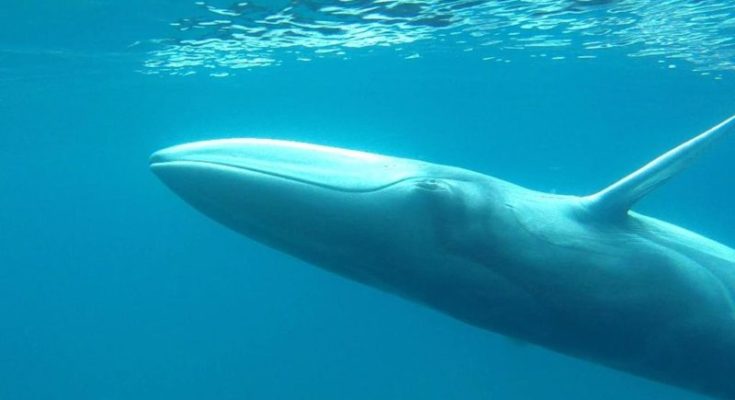Colombo, Sri Lanka – The discovery of an Omura’s whale (Balaenoptera omurai) in Sri Lankan waters has just been published in the journal Marine Biodiversity Records. This unusually coloured, small baleen whale was documented off the southern coast of Sri Lanka in February 2017 during routine field surveys. This is a significant and exciting finding because Omura’s whales were only identified as a distinct species from Japan as recently as 2003.This species is now known from the northeastern and south Atlantic, western Pacific and Indian Ocean.
Within the Indian Ocean, the majority of records are from the eastern and western Indian Ocean with one sighting from the northwestern Indian Ocean. This finding from Sri Lanka expands its range to the central Indian Ocean. While scientists originally believed that the eastern Indian Ocean population was likely discontinuous from those in the western Indian Ocean this record provides some evidence for connectivity across this ocean basin. Further, the record of an entanglement scar on the left upper jaw of this individual whale is an indicator of the threats it faces within our waters.

Based on five distinct morphological characteristics including jaw asymmetry, presence of a prominent central rostral ridge, blaze on right side, asymmetrical chevron on left and right sides and a strongly falcate dorsal fin the individual was positively identified as an Omura’s whale.

The author, Dr. Asha de Vos, Founder of Oceanswell was particularly excited about the bigger implications of this finding. She said, “This finding is significant to Sri Lanka because it adds another species to our list of whales and serves as a reminder of the wealth of our oceans and the fact that we live in one of the most understudied ocean basins in the world. This finding is also significant at a global level because of the paucity of existing data and knowledge about this species despite its preference for shallow coastal waters. It is also incredibly symbolic because Omura’s whales grow to 33 feet – they aren’t invisible to the naked eye nor are they easily overlooked. However, we know next to nothing about them and are still discovering where they roam. This species has a preference for shallow shelf waters, areas that are constantly under use by people. So if we are overlooking these giants, imagine what other species we might be missing out on? Imagine the abundance of life that is waiting to be discovered and protected?”
The images illustrate the characteristic features of this species and highlight the importance of field surveys and photo-identification work that enable the discovery and description of new species and provide opportunity to expand our knowledge of the marine mammals inhabiting our oceans. As such, please submit any images of Bryde’s whales or Omura’s whales from Sri Lankan waters, to the respective catalogues by emailing whalessrilanka@gmail.com.
Link to article from Marine Biodiversity Records (Open Access journal): http://bit.ly/2ssjgwT
To learn more about this discovery please contact
Dr. Asha de Vos
Founder,
Oceanswell
asha@oceanswell.org
Featured Image – By Salvatore Cerchio et al. / Royal Society Open Science – Royal Society Open Science, CC BY 4.0, https://commons.wikimedia.org/w/index.php?curid=44630087





Dear Sir/Madam,
We take this opportunity to introduce you to Lanka Monthly Digest (LMD),
our flagship publication which pioneered the magazine culture in this country.
Launched in 1994, LMD is the only magazine with Superbrand status in Sri Lanka today.
You can see more about us at http://www.lmd.lk
We are the also the publishes of the CINNAMON magazine,
a magazine done for Cinnamon Hotels & Resorts in Sri Lanka.
You can see more about us at http://www.cinnamonmagazine.com/
We will be carrying an article covering the latest sighting of the Omura’s whale in Sri Lanka
for the October-November issue of Cinnamon, and would greatly appreciate
if you could share some pictures/photos (high resolution 300 dpi) of the whale with us.
Looking forward to your favourable and earliest reply.
Dear Nicola,
Thank you very much for the inquiry. Actually It’s really difficult to find images of this whale species as this sighting too was an unexpected one. The one we had added in our article was from the internet and had been taken by a group of researchers in a research in waters near Madagascar.
And if you can please contact Dr. Asha de Vos at “whalessrilanka@gmail.com”. She’s the one who published this article so she should be having some pictures and some more information as well.
Thanks,
Admin
this things nearly get extinct?